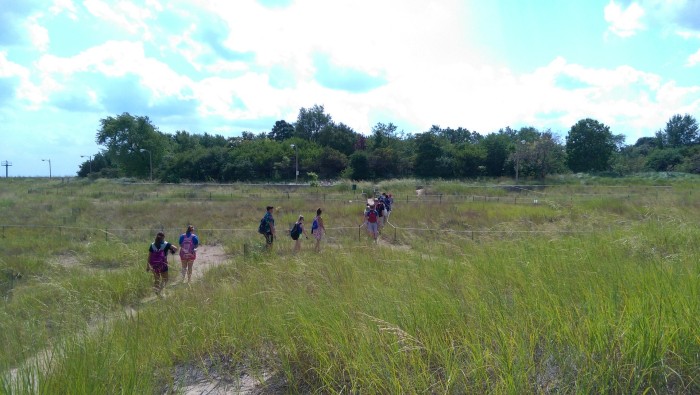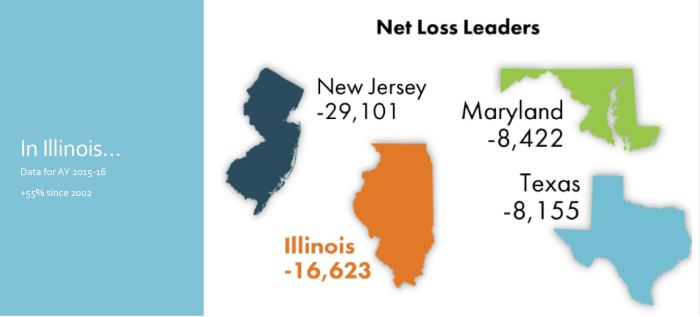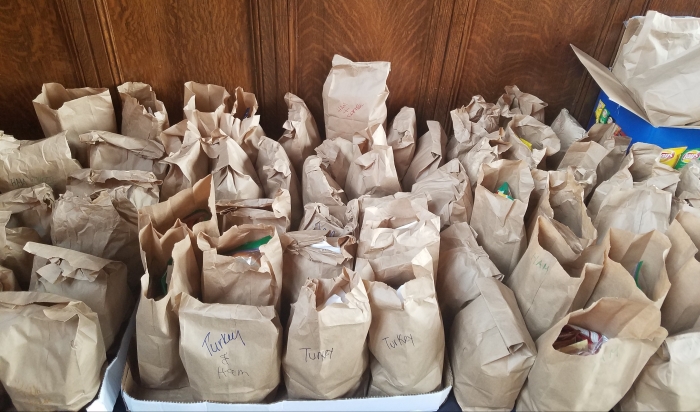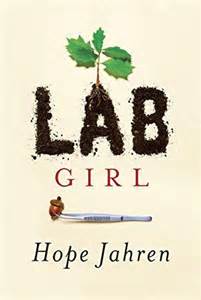By Jennifer Long

My Appreciation for the Earth is Constantly Growing
I grew up in Tokyo, Japan. The city had green spaces, but my existence there was mostly one surrounded by concrete. Luckily for me, our family trips were frequent, but they never included exploring nature or any outdoor adventures. And so I came to prefer urban environments.
It wasn’t until a two-week canoe trip near Quetico, Canada in 2009, where I portaged through lakes and over land, that I truly experienced wilderness (or at least, relatively untouched-by-humans land). The water in certain areas was so pure; you could fill up your water bottle in the lake and drink it safely without purifying it.
The trip left a huge impact on me. In addition to giving me a higher tolerance for mosquitos and leeches, and leaving me physically stronger from all the heavy lifting, it gave me a much deeper appreciation for our Earth. It got me thinking critically about how we treat our Earth.
Why is it that Quetico is one of the few places you can still drink water directly from the lake? I starting thinking about the language we use to connect with the Earth, and our detrimental practices against it.
Because of that trip, and for many other reasons, I try to celebrate the Earth all the time—with a special emphasis during Earth Month.

Thoughtful Conservation and Sustainability
According to one source, if you imagine the earth’s 4.5 billion years in the timeline of one week, then modern human existence would only be the last six seconds of the Saturday evening, at 11:59:54.
In this scenario, “one-eightieth of a second ago, we discover[ed] oil, thus accelerating the carbon blowout started by the industrial revolution.’’ [Avlonas, Nassos, 4]
Humans have had such a direct, negative impact on carbon dioxide emissions and nonrenewable natural resources (and consequent global warming), that we are forced to be reactive to a problem we have caused.
To keep conservation and sustainability top of mind personally, I do whatever I can to find peaceful moments to enjoy the Earth: hikes, walks by the lakes—whatever nature I can access.
I strive to reduce my waste by recycling at home and at work.
I try reusing items by repurposing or donating, instead of just throwing things out and adding to the growing landfills.
Buying locally grown food can also help, as grocery stores’ food transportation adds to emissions. Being mindful of dietary and shopping choices can also make a difference. Food that we throw out ends up decaying in landfills and producing methane, which is more harmful than CO2 emissions.

Composting with Worms
Most recently—I’ve begun composting with worms!
Red wigglers, shipped from Europe, and provided by the Peggy Notebaert Nature Museum in Chicago, are hard at work in a five-gallon plastic tub (with air holes) underneath my kitchen sink. They consume approximately half a pound of food every day.
The worms consume the food before it decays (so no smells other than that of dirt!) and turn it into soil through their digestive processes. I can then use the soil (which they migrate away from, making it easier to scoop up) to grow herbs from the porch attached to my walk-up apartment in Chicago.
If I had more space, I would be able to have a more sophisticated system and do outdoor composting (where you can throw all food scraps, no worms). I would probably grow my own plants and perhaps save money on vegetables.
Composting with worms is a skill I acquired and have taught in workshops as a Chicago Conservation Corps Leader, through a program run by the Peggy Notebaert Nature Museum. In this program, people can train on major issues affecting Chicago (water, food, transportation and more) and then create projects in communities where they are stakeholders to spread awareness of conservation and sustainability.
I’ve found this opportunity to be rewarding and have enjoyed finding a place to learn and practice new skills. It has also made me more aware of celebrating Earth Month—and conservation and sustainability—in the context of Chicago.

Water Conservation Efforts
Water is a growing concern.
While the Earth’s surface is 71 percent water, only 3 percent of that water is without saline. Of that 3 percent, more than 99 percent is unavailable in the form of ice caps, glaciers or groundwater. This leaves us with only 0.10 percent of water (which happens to reside mostly in lakes, swamps and rivers) for industrial, agricultural and human use. [Avlonas, Nassos, 10].
For this reason, I began assisting with fundraising strategies for an organization called Surge for Water, which provides water sanitation and hygiene solutions to developing countries through community-based relationships around the world. Their mission is to ensure that everyone has access to water, as it is becoming more and more scarce!
Actively participating with your time, treasure or talent in an issue you feel strongly about is one way to make a positive impact on the Earth.

What Earth Month Means to Me
Sustainability should be a mindset at all levels: at the individual level and at the systemic level with governments and corporations.
We have the opportunity to influence larger systems and institutions, such as the agricultural production industry, with the products that we purchase. We can also make a difference with our lifestyle choices and habits. We just need to keep conservation and sustainability in mind. I believe that all the small steps that we each take will have a large impact over time.
Earth Month reminds me of the powerful impact we can have, and do have, on the Earth. It reminds me to celebrate the Earth’s many wonders and to participate in its preservation.
By finding meaningful ways to celebrate the Earth on a daily basis, and especially during Earth Month, we can help combat climate change and be a part of the solution to protect our planet’s natural resources for generations to come.

Jennifer Long is a DWN member at large and an assistant director of development for DePaul’s Richard H. Driehaus College of Business.
What to be a contributing writer on the DePaul Women’s Network blog? Click here for more information.







 From 17th century France, St. Louise was St. Vincent’s most trusted and key collaborator. She dedicated her life to the service of others, serving the poor alongside St. Vincent and educating women to help those most in need. St. Louise was also a wife (then widow), a mother (to a son with special needs), a nurse, social worker, teacher and community organizer. She founded the Daughter’s of Charity, a community of religious women that still exists today.
From 17th century France, St. Louise was St. Vincent’s most trusted and key collaborator. She dedicated her life to the service of others, serving the poor alongside St. Vincent and educating women to help those most in need. St. Louise was also a wife (then widow), a mother (to a son with special needs), a nurse, social worker, teacher and community organizer. She founded the Daughter’s of Charity, a community of religious women that still exists today. But this year’s High Tea with St. Louise was different. In addition to providing a space and opportunity to enjoy afternoon tea and treats with fellow DPU women, our 2017 High Tea included a service activity.
But this year’s High Tea with St. Louise was different. In addition to providing a space and opportunity to enjoy afternoon tea and treats with fellow DPU women, our 2017 High Tea included a service activity. After Barbara’s keynote, the local nonprofit that we would be serving that day was introduced.
After Barbara’s keynote, the local nonprofit that we would be serving that day was introduced.  “There are at least 50 students at DePaul who are homeless, or housing insecure, as we prefer to say, during any given quarter,” shared Sister Judy Warmbold, the Dax program coordinator. “The problem is… we don’t know who these students are. The best thing you can do to help is know that this program exists, help spread the word and help identify students who you suspect might need this program.”
“There are at least 50 students at DePaul who are homeless, or housing insecure, as we prefer to say, during any given quarter,” shared Sister Judy Warmbold, the Dax program coordinator. “The problem is… we don’t know who these students are. The best thing you can do to help is know that this program exists, help spread the word and help identify students who you suspect might need this program.”




 I joined DePaul in the fall of 2013 in the Office of Advancement, on a team that works to develop special gifts from individual donors by encouraging philanthropy to a variety of initiatives. As you might guess, this externally facing job is rather autonomous and does not require much engagement across the university.
I joined DePaul in the fall of 2013 in the Office of Advancement, on a team that works to develop special gifts from individual donors by encouraging philanthropy to a variety of initiatives. As you might guess, this externally facing job is rather autonomous and does not require much engagement across the university. By Deirdre Laverdiere
By Deirdre Laverdiere Lab Girl
Lab Girl Our society is not yet inclusive or representative of all people’s voices. Women, for example, have a number of experiences related to violence and oppression that still need to be heard and championed.
Our society is not yet inclusive or representative of all people’s voices. Women, for example, have a number of experiences related to violence and oppression that still need to be heard and championed.
